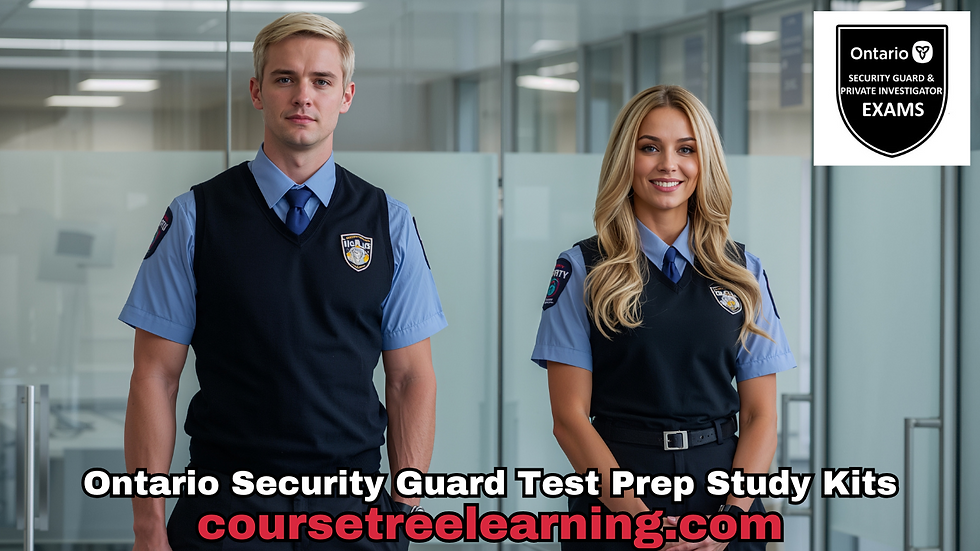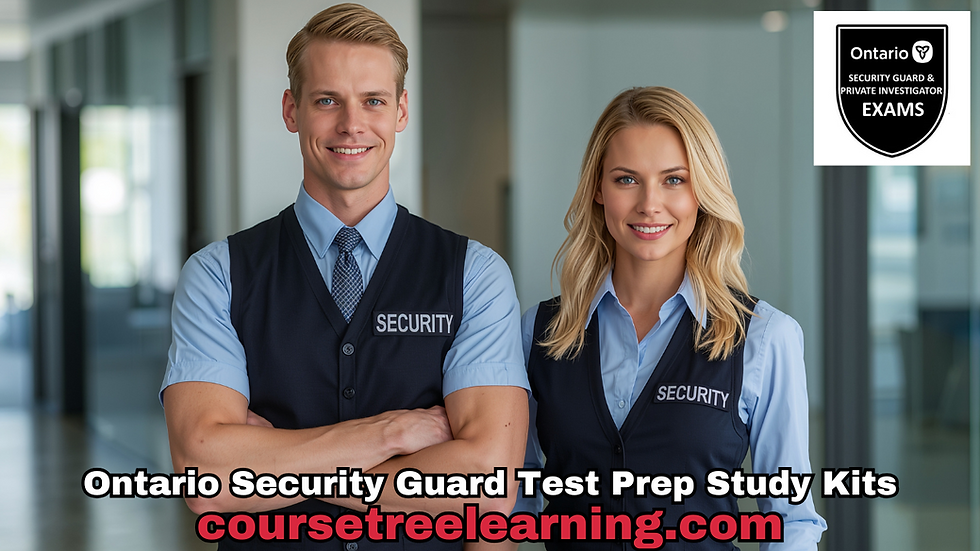Ontario Security Guard Test Practice Questions and Answers PFD Study Kit
- Course Tree
- Aug 10
- 6 min read
TL;DR – Ontario Security Guard Test Practice
Get your exam study materials at www.coursetreelearning.com
Great exam prep can dramatically reduce preparation time, stress, and the risk of exam failure
Understand the PSISA (Private Security and Investigative Services Act) inside and out
Practice with realistic, scenario-based Ontario security guard test practice questions—not just theory
Learn to handle emergency situations, write incident reports, and apply use-of-force guidelines correctly
Flashcards, mock tests, and real exam-style practice questions make recall faster and reduce test-day anxiety

Ontario Security Guard Test Study Kit - For more information check out https://www.coursetreelearning.com/product-page/ontario-security-guard-test-prep-kit
Ontario Security Guard Test Practice – What You Need to Know
If you’re searching for Ontario security guard test practice, you’ve probably already run into a dozen different ways people refer to the same thing—Ontario security guard practice test, Ontario security guard exam practice, Ontario security guard practice questions, Ontario security guard mock test, or even just security guard license practice test Ontario. In training schools, instructors might call it a sample test. On government websites, it’s the Ontario security guard exam. Employers sometimes refer to it as the 60-question licensing exam. Some people even shorten it to PSISA Ontario practice test because the law you’re tested on is the Private Security and Investigative Services Act. In forums, you’ll hear terms like “practice exam,” “exam simulator,” or “study quiz.” The point is—they all mean the same thing: a structured, question-based study approach designed to prepare you for the real licensing exam.
The Ontario security guard licensing exam is not just about memorizing facts—it’s about applying them. You’ll need to know your legal authority, your limits, and exactly how to respond in specific situations without overstepping your role. Passing it is your ticket to legally work as a licensed security guard in Ontario, which means preparation is non-negotiable.
The Three Most Challenging Parts of the Exam – According to Real Students
1. Legal Powers & Limitations “Honestly,” says David, “I thought I had this down after reading the PSISA once. Then I did a practice exam and realized the questions are worded to trip you up—especially around when you can or can’t arrest someone. The legal authority section is brutal if you haven’t drilled it.”
2. Emergency Response Protocols Priya shared that she found the emergency response section tough because it’s more than just knowing what a fire alarm sounds like. “They test the order of your actions, the chain of communication, and the exact role you play in situations like bomb threats or medical emergencies.”
3. Report Writing “Report writing sounds easy until you get a scenario and have to write it exactly how a professional would,” says Mark. “Miss one important detail or use the wrong style and it’s points lost. The test doesn’t just want a story—they want facts, timelines, and professionalism.”
Expert Insights
Expert Name: Professor Michael Arntfield Title & Credentials: Criminologist & Former Police Detective, Western University Reference Link: [www.coursetreelearning.com]
Key Takeaways: Prof. Arntfield emphasizes that the most successful candidates don’t just memorize—they train like they’re already on the job. He notes that scenario-based learning (mock tests, flashcards, and roleplay) builds both confidence and speed in applying the PSISA and emergency protocols correctly.
Personal Story (Adapted): “When I was prepping for my certification, I thought knowing the laws by heart would be enough. But the exam threw real-world scenarios at me, and I froze. I realized I had studied for recognition, not application. The shift came when I started doing timed practice exams and writing mock incident reports. That’s when the material finally stuck.”
Ontario Security Guard Exam Overview
Number of Questions: 60 multiple-choice
Time Limit: 75 minutes
Pass Mark: 62% (37 correct answers)
Format: Scenario-based and factual questions
Eligibility: Must complete a Ministry-approved training course
Fee: $66.50 (as of this writing)
Registration: Through ServiceOntario testing centers or authorized providers
Study Material Breakdown
1. Comprehensive Study Notes
Covers PSISA, legal authorities, emergency response, use of force, and report writing
Organized for efficient learning—no filler, just what’s tested
2. Exam Bank Questions & Answers
Based on real past exam structures
Updated regularly to reflect the latest Ministry requirements
3. Flashcards
Printable Q&A for quick review
Perfect for mobile study sessions and active recall training
10 Sample Multiple-Choice Questions
1. Under the PSISA, what is the primary duty of a licensed security guard? A) Enforce all laws in Ontario B) Protect persons and property within their assigned duties C) Conduct criminal investigations D) Arrest anyone committing a summary offence Answer: B – Security guards are not police; they protect persons and property within their assigned scope.
2. You witness a minor theft. What’s your correct first step? A) Arrest immediately B) Call 911 and observe C) Detain without calling police D) Ignore it if property is recovered Answer: B – Your role is to report and observe unless citizen’s arrest criteria are met.
3. In a fire alarm situation, what’s your first action? A) Attempt to put out the fire B) Call your supervisor C) Evacuate people to safety D) Pull the alarm if not already activated Answer: D – Trigger the alarm (if not already active) before evacuation.
4. Which of the following is not part of the use-of-force continuum? A) Officer presence B) Verbal commands C) Deadly force as first response D) Physical control Answer: C – Deadly force is only justified in extreme, life-threatening situations.
5. What’s the minimum passing score for the Ontario security guard licensing exam? A) 50% B) 60% C) 62% D) 65% Answer: C – You need 62% to pass.
6. What’s the correct order for responding to a bomb threat? A) Evacuate, call police, search B) Call police, search, evacuate C) Search, evacuate, call police D) Call police, evacuate, follow instructions Answer: D – Always alert police first.
7. Who issues your security guard license in Ontario? A) Ontario Provincial Police B) ServiceOntario C) Ministry of the Solicitor General D) City by-law office Answer: C – The Ministry of the Solicitor General is responsible.
8. What’s the best definition of “reasonable grounds”? A) Your personal suspicion B) Facts or circumstances that would lead an average person to believe something is true C) A legal term with no set meaning D) Information from a trusted co-worker Answer: B – It’s an objective standard based on reasonable person judgment.
9. A proper incident report must: A) Be detailed, chronological, and factual B) Include personal opinions C) Be written casually D) Only record major incidents Answer: A – Professional reports are factual, chronological, and objective.
10. Which law governs security guards in Ontario? A) Criminal Code of Canada B) PSISA C) Highway Traffic Act D) Trespass to Property Act Answer: B – The Private Security and Investigative Services Act governs the profession.
10 FAQs
Q1: How long is the Ontario security guard exam? A: 75 minutes.
Q2: How many questions are there? A: 60 multiple-choice.
Q3: What’s the passing mark? A: 62% (37 correct answers).
Q4: Can I take the test online? A: No, it must be done at an authorized testing center.
Q5: What’s the main law covered? A: PSISA – Private Security and Investigative Services Act.
Q6: Can I work without the license? A: No, it’s illegal to perform security guard duties without it.
Q7: What’s the fee? A: $66.50 (subject to change).
Q8: Do I need first aid training? A: Yes, standard first aid and CPR are required.
Q9: What’s the best way to prepare? A: Use a mix of study notes, practice exams, and flashcards.
Q10: Is the exam open book? A: No.
Applied Knowledge Example – Conducting a Security Patrol
A licensed Ontario security guard may be tasked with a full property patrol. This starts with reviewing the shift log for recent incidents. Next, check all security equipment—radios, flashlights, keys. Begin the patrol by following the designated route, scanning for hazards, unauthorized access, or suspicious behavior. Use access control procedures at restricted areas, ensuring locks are secure. Document each observation in your notebook with time, location, and details. If an incident occurs, follow emergency protocols—reporting to dispatch or a supervisor immediately. At the end of the patrol, file a formal report with all findings. This procedure ensures both property safety and compliance with licensing standards.
Key Takeaways
Get your exam study materials at www.coursetreelearning.com
www.coursetreelearning.com has a 92% exam success rate and a money-back guarantee if you’re not successful
Great exam prep reduces stress, time, and risk of failure
Focus on scenario-based practice, not just theory
Learn emergency protocols and report writing like a pro
Use flashcards and mock exams for active recall
Time yourself on practice tests to build real exam endurance
📚 Get your exam preparation materials today at: ➡️ www.coursetreelearning.com


Comments